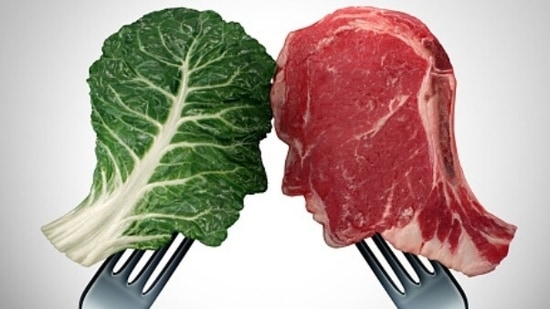Recent years have seen a sharp increase in the popularity of plant-based meats as fitness enthusiasts look for more sustainable and healthier food options. These products have the flavour and texture of meat without using any animal ingredients but it is important to weigh the possible advantages and disadvantages of eating plant-based meats in terms of health.

Advantages of eating plant-based meats:
In an interview with HT Lifestyle, Dr Navneet Deora, PhD in Food at Bluetribe, shared, “There are several benefits of switching to plant based meats. For regular meat consumers it helps them avoid issues related to meat consumption. In India these are primarily related to higher incidence of lifestyle diseases and vulnerability of organised meat production to claims of antibiotics and hormone use which can create endocrine disturbance and resistance to antibiotics. For vegetarians, it helps them reduce dependence on milk, milk based products for daily protein. As milk, paneer are also high in fat consumers with high cholesterol or body weight issues may struggle to have adequate protein if told by their doctor to reduce/avoid milk products. Plant based meat products available from leading companies that are very low in cholesterol compared to meat/milk based products have potential to improve diets for both vegetarian and non-vegetarian consumers, especially those already diagnosed or at risk of heart disease.”
Bringing her expertise to the same, Dr Sangeeta Tiwari, Clinical Nutritionist at Artemis Hospitals, said, “Plant-based meats offer a lot of health benefits and can positively impact cholesterol levels, heart health, and overall well-being. These products, often made from ingredients like soy, peas, and lentils, are typically lower in saturated fats in comparison to their animal-based counterparts. This reduction in saturated fat can contribute to healthier cholesterol levels, which is beneficial for heart health. Many plant-based meats are also rich in fiber, which further supports cardiovascular health by contributing in lowering cholesterol and improving blood pressure. Plant-based meats are generally free from cholesterol altogether, which is a significant advantage for those managing or reducing the risk of heart disease.”

She added, “The presence of essential nutrients like vitamins, minerals and antioxidants in many plant-based meats can enhance overall well-being. These nutrients play an active role in supporting immune function, promote healthy skin, and may reduce inflammation. Furthermore, incorporating plant-based meats into a diet can encourage a varied intake of plant-based proteins, which are often associated with a lower risk of chronic diseases such as type 2 diabetes and certain cancers. Since they are also often less resource-intensive to produce, choosing plant-based meats can have positive environmental impacts, aligning with a sustainable lifestyle. In a nutshell, plant-based meats offer a heart-healthy alternative to traditional meats, supporting lower cholesterol levels and promoting a balanced, nutritious diet that contributes to long-term well-being.”
Kanikka Malhotra, Consultant Dietician and Diabetes Educator, highlighted the potential health benefits as –
● Reduced Saturated Fat and Cholesterol: Plant-based meats are generally lower in saturated fat and cholesterol compared to animal-based meats. This can contribute to lower LDL cholesterol levels, reducing the risk of heart disease.
● Increased Fiber: Many plant-based meats are fortified with fiber, a nutrient essential for digestive health and weight management. Fiber can help regulate bowel movements, prevent constipation, and promote satiety.
● Reduced Environmental Impact: The production of plant-based meats often has a lower environmental footprint than animal-based meats, reducing greenhouse gas emissions and water usage.
She pointed out, “Since plant-based meats are lower in cholesterol and saturated fat, eating them can generally be good for heart health. It is imperative to take into account both the product’s general nutritional profile and any possible allergies. It is advised to include a range of plant-based foods, such as whole grains, fruits, vegetables, and legumes, in your diet to gain the most advantages. Depending on the brand, ingredients, and processing techniques, plant-based meats might have rather different specific nutritional contents. Some plant-based meats may be richer in saturated fat or salt than others. The context of the entire diet is important.”
Disadvantages of eating plant-based meats:
According to Dr Navneet Deora, “There are two drawbacks one must be conscious of: one is in choosing the right product: choose one from a reputed company since some companies still make products using palmoil which has trans fats. The other is choosing the right product form, while there are products like nuggets created to get consumers to taste plant based meat easily, health conscious people can choose products like plant based keema which have low salt and low cholesterol as they do not need deep frying.”

Dr Sangeeta Tiwari revealed, “While plant based meats have a lot of benefits, they have some drawbacks as well. They can be low in essential nutrients such as vitamin B12, iron, and omega-3 fatty acids, which are commonly found in animal products. Furthermore, many plant-based meats are highly processed and can contain additives, preservatives, and artificial ingredients that might not be as healthy as whole foods.”
Kanikka Malhotra concluded, “Plant-based meats may be lower in cholesterol and saturated fat, but eating too much of them or including them in an unhealthy diet can still have a detrimental effect on heart health. While short-term studies have shown potential benefits of plant-based meats, more long-term research is needed to fully understand their impact on overall health and well-being.”
Disclaimer: This article is for informational purposes only and not a substitute for professional medical advice. Always seek the advice of your doctor with any questions about a medical condition.


